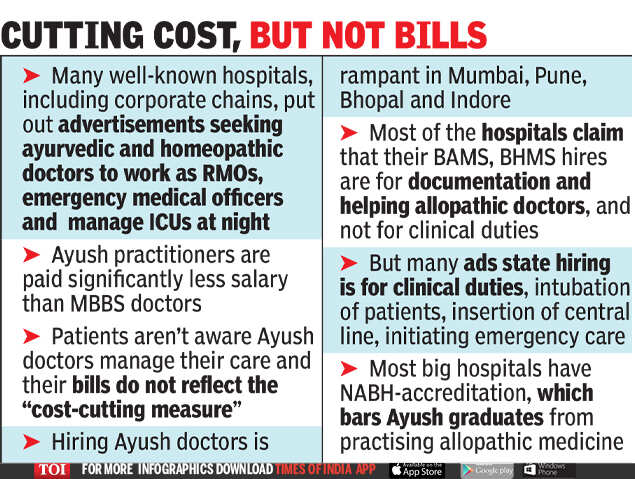Popular job sites are full of advertisements placed by some of the most well-known hospitals, including corporate chains, seeking Ayurvedic and Homeopathic doctors to work as resident medical officers, emergency or casualty medical officers and even to manage ICUs at night. While these AYUSH practitioners might come at half the salary of a qualified MBBS doctor, patients admitted in these hospitals for ‘world class’ care are not only unaware that AYUSH doctors manage their care, their bills too do not reflect this cost-cutting measure.
The government has been pushing to train AYUSH doctors to give basic healthcare in rural areas where there is an acute shortage of doctors. However, the advertisements are by private hospitals located in the biggest cities, where there is often a glut of MBBS and specialist doctors.

The practice of hiring AYUSH doctors seems most rampant in Mumbai and Pune. The hospitals that have put out ads for them include Fortis Hospital, Mulund, Asian Heart Institute and Wockhardt Hospital in Mumbai and Ruby Hall Clinic and Deenanath Mangeshkar Hospital in Pune.
Most of these hospitals when contacted by TOI denied that their BAMS, BHMS hires were allowed to do clinical duties and said they were mostly for documentation work and to assist allopathic doctors. However, many of the ads state clearly that the hiring is for clinical duties which include intubation of patients, insertion of central line, assessing changes in patient condition, initiating emergency treatment, performing emergency and ICU procedures etc.
When this correspondent called up one of these hospitals posing as a currently jobless BAMS graduate with three years’ experience, the HR person said the work would involve clinical duties in casualty, ICU and wards and “two nights per week and a rotational off”. “The salary is Rs 18,000, but since you are experienced we can pay you Rs 21,000 plus an additional Rs 3,000 per month for Covid duty,” said the HR person.
“MBBS graduates are paid Rs 40,000-45,000 by many of these hospitals. But they don’t even want to spend this much. So, they hire BAMS and BHMS or even Unani graduates who would come at less than half that cost. How low do they want salaries to go? What about the quality of care they promise patients?” asked an assistant professor in a private medical college in Bangalore.
Most of these big hospitals are also accredited with National Accreditation Board for Hospital and Healthcare (NABH). “What is the accreditation worth if AYUSH graduates with no licence to practice allopathic medicine are being employed to provide patient care? NABH supposedly assures quality of a hospital and that is why the rates for an NABH accredited hospital are higher,” pointed out a senior consultant in a private hospital in Delhi.
Dr Devi Shetty told TOI: “These doctors do not have the licence to practice allopathy. They cannot practice it.” Former president of the Indian Medical Association, Dr Ravi Wankhedkar, agreed: “This is illegal. We are opposed to this and IMA has said this repeatedly,” he said.
“If I am paying one lakh per day for care in such a huge five-star hospital, as a patient I have the right to know whether the doctor treating me is a vaid or homeopath. This is clearly cheating of patients. There ought to be an enquiry on whether using these doctors have led to higher mortality among ICU patients and Covid patients. Medical negligence by an allopath would mean a case before the medical council. What happens if a patient is harmed by something done by this AYUSH doctor practising allopathy? Who will take the responsibility?” asked a doctor working in a corporate hospital. “My mother was admitted to a top private hospital in Pune. To my horror I discovered that the only doctors on duty at night were ayurvedic graduates. This is totally unacceptable,” said a medical college professor.
“It is rampant in places like Bhopal and Indore. Several hospitals were caught employing AYUSH graduates for ICU duty at night in a sting operation in 2018, but the practice continues as the government has turned a blind eye. This is the low-cost model of private hospitals. But there is nothing low cost about their bills,” said Dr Anand Rai, an ophthalmologist and whistleblower in the Vyapam scam.
A prominent surgeon working in a private hospital in Mumbai which has AYUSH graduates in the ICU at night, however, asked what was wrong in employing these graduates if they were trained in the necessary skills. “They are a large workforce and we need to use them creatively. If they are skilled, they also ought to be paid better. It is about capability and not about which system of medicine they come from,” he added.
“A critically ill patient is someone who has complex pathophysiological problems and that is why they are in the ICU. Treating these patients requires an understanding of the complex disease process and treatment has to be modulated accordingly. It is wrong to allow a person trained in a different system of medicine like an Ayurvedic or Homeopathic who has a different understanding of disease processes to manage a patient in a critical condition,” said the head of the critical care department in a large charitable hospital in Delhi.
“If the patient wanted to be treated by an AYUSH doctor he would have gone to an AYUSH hospital. If the patient has come to an allopathic hospital, can the person be taken care of by an AYUSH doctor masquerading as an allopath?” asked a professor in AIIMS, Delhi.




)


More News
Delhi LG Calls For NIA Probe Against Kejriwal In Alleged Funding From Banned Terrorist Organisation Sikhs for Justice
Mamata Banerjee’s politics dirty, says West Bengal governor CV Ananda Bose | India News – Times of India
Fight To Save Democracy And Constitution: Rahul Gandhis Writes Congress Party Workers